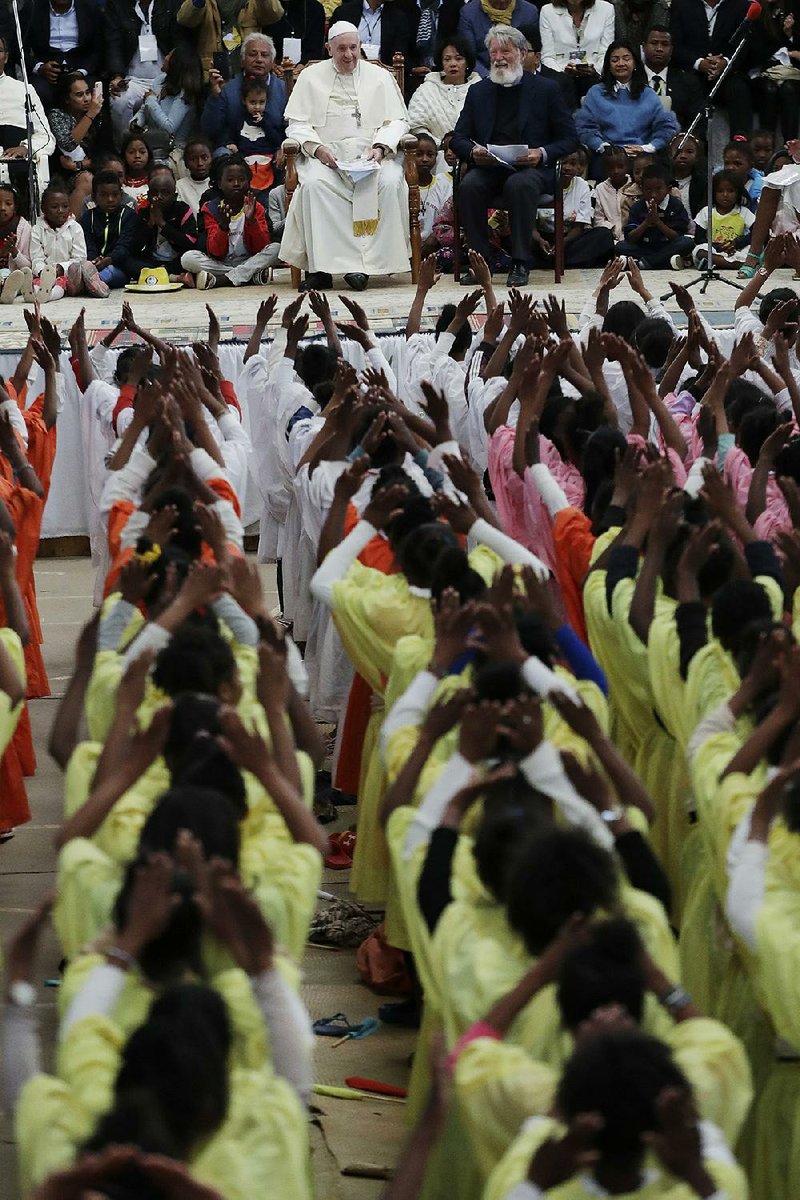ANTANANARIVO, Madagascar -- Pope Francis insisted Sunday that poverty isn't inevitable and that the poor deserve the dignity of work as he visited a rock quarry in Madagascar where hundreds of people toil rather than scavenge in the capital's biggest garbage dump.
Francis appealed for new development strategies to fight global poverty as he visited the Akamasoa project, or "City of Friendship," which sits on a hillside above the dump in Antananarivo. The project is the brainchild of an Argentine priest who was so overwhelmed by the abject poverty of Madagascar that he set about creating ways for the poor to earn a living.
Over 30 years, the Akamasoa quarry has produced the stones that built the homes, roads, schools and health clinics that now dot the pine-covered hillside.
Villagers, students and quarry workers lined the neat streets and pastel-painted doorways to greet the pope as he arrived, and thousands of children sang for him in the village auditorium.
Speaking in French, Francis told them that Akamasoa's founder, the Rev. Pedro Opeka, had been a student of his in 1967-1968 at a Buenos Aires seminary, but that he remembered that Opeka didn't much care for studying.
"He had a love for work," Francis said to giggles.
Returning to his prepared remarks and with Madagascar's President Andry Rajoelina listening behind him, Francis told the villagers that the existence of Akamasoa meant that God had "heard the cry of the poor."
[Video not showing up above? Click here to watch » https://www.youtube.com/watch?v=WgL_Ol8Q4Ag]
"Your plea for help -- which arose from being homeless, from seeing your children grow up malnourished, from being without work and often regarded with indifference if not disdain -- has turned into a song of hope for you and for all those who see you," Francis told them. "Every corner of these neighborhoods, every school or dispensary, is a song of hope that refutes and silences any suggestion that some things are 'inevitable.'"
"Let us say it forcefully: Poverty is not inevitable!"
Opeka was working as a Lazarist missionary in Madagascar when he was inspired to create Akamasoa after witnessing the degrading life led by the parents and children who lived off the dump.
The Akamasoa project, which is funded by donors around the world and recognized by the Madagascar government, says it has built some 4,000 homes in more than 20 villages serving some 25,000 people since its foundation in 1989. About 700 people work in the rock quarry, using simple mallets to chop chunks of granite into cobblestones or pebbles, while others work as carpenters or attend training classes. It says 14,000 children have passed through its schools.
Opeka said the low salaries he can pay the quarry workers are an injustice. But he said they are at least better than what scavengers earn in the dump, and are enough to enable parents to send their children to school.
"Akamasoa is a revolt against poverty, it is a revolt against inevitability," Opeka said ahead of the pope's visit. "When we started here it was an inferno, people who were excluded from the society."
Despite Madagascar's vast and unique natural resources, it is one of the poorest countries in the world. The World Bank says 75% of its 24 million people live on less than $2 a day; only 13% of the population has access to electricity.
A Section on 09/09/2019
